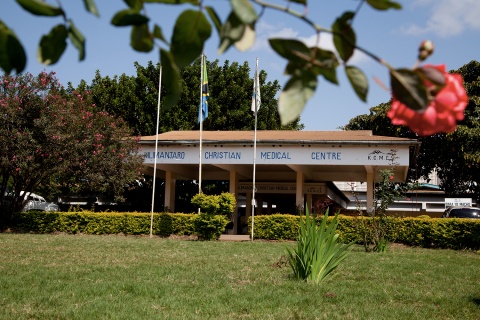Duke Global Health Institute Receives D43 Grant for Research in Tanzania

Photo above: Front entrance to the Kilimanjaro Christian Medical Centre.
Every year, nearly 5 million people die from injuries and hundreds of millions more sustain non-fatal injuries that require medical attention globally. Concerningly, low- and middle-income countries (LMICs), account for 90% of all injury-related deaths. Specifically, in Tanzania, injury is a leading cause of death. When comparing similar injuries, the mortality rates in LMICs are much higher than in high-income countries.
A quality trauma care system requires a continuum of services from epidemiologic surveillance, pre-hospital care, hospital-based care and post-hospitalization rehabilitation services. Yet in many LMIC settings, an evidence-based continuum doesn’t exist, and researchers to create this evidence are absent.
The Trauma Research Capacity Building in Kilimanjaro program (TRECK) will fill that gap by investing and training the next generation of injury researchers in Tanzania. Blandina Mmbaga, MD, PhD, Kilimanjaro Christian Medical Centre (KCMC) in Moshi, Tanzania and the Duke Global Health Institute, and Catherine Staton, MD, MS, Associate Professor of Surgery, Division of Emergency Medicine, have been awarded a 5-year international research training grant (D43) from the Fogarty International Center of the US National Institutes of Health.

Associate Professor of
Surgery, Division of
Emergency Medicine
The project builds upon an over 20-year history of collaborations between KCMC and Duke to further develop research capacity in Tanzania. This program will support the training of two candidates in a 4-year doctoral program and 10 candidates in a 2-year master’s program at the Kilimanjaro Christian Medical University College to become the next leaders in trauma research in the Kilimanjaro region. This training program entails a tailored experience for each learner, including an individualized career development plan and didactics courses, experiential learning, and career building components.
As program directors, Dr. Staton and Dr. Mmbaga have assembled a multi-disciplinary team of highly experienced mentors at both institutions that will guide the clinician and non-clinician research trainees in their respected areas of expertise along the trauma pathway, including surveillance and prevention, pre-hospital care, hospital-based care as well as rehabilitation.
As part of their experiential learning experience, each trainee will have a mentorship panel from KCMC and Duke to align with their goals as outlined in their individual career development plans. Additionally, the trainees will also have a site visit to Duke University, a research practicum, and a research thesis. Each component of this experiential learning will be based on individual learning goals and will be tailored to each trainee’s ultimate career plan. The mentorship and leadership team will further be supported by a Training Advisory Committee with extensive experience in the education and training of junior researchers, as well as an External Advisory Committee, to integrate the expertise and guidance from highly skilled consultants in their fields.
We are honored and excited to be part of training the next generation of trauma researchers in the Kilimanjaro region over the next 5 years.
Give to Duke Emergency Medicine
The Duke Department of Emergency Medicine relies on individual gifts and philanthropic partnerships to help support our clinical, research, and educational missions and to secure funds for the future.
